Generation Lost In Translation
A Child Of The Cameroonian Diaspora In Search Of Her Mother Tongues
I always thought that writing about my family here would be very linear, but since I started, it hasn’t been the case. And it is fine that way too. Today’s story is about mother tongues. One thing I’d say is that people forget that in Africa, too, different cultures mix. Even within the same country, people don’t speak the same languages, eat the same food, or share the same traditions. And that is my family’s case. I am both Ewodi and Douala, which means I have, in total, three mother tongues, but I am only fluent in one, which is French. Exploring my relationship with my other two mother tongues is a fascinating experience I wanted to share.
Below are the two first pieces I wrote about my family:
Out of 18 grandchildren, only two can speak our mother tongue with our grandmother. And I am not one of the two, so I can’t help but be envious. After all, my two eldest cousins and I were the only ones born in Cameroon. When I was a child, our grandmother never talked to us in French. She always did in Ewodi — one of the 250+ languages spoken in Cameroon — and somehow, it was as if I was programmed to reject it already.
There is a picture of me, probably around 1990, at school wearing a Phrygian cap bearing the colours of the French flag. This headwear symbolises Marianne, the allegory of the French Republic and, by extension, France. I was dressed up like her to celebrate the bicentenary of the French Revolution some thirty years after Cameroon’s independence from France. It is no wonder that when my grandmother talked to me in Ewodi, I would reply a little bit irritated: “But grandma, why don’t you speak French like everyone else?” Even our old cook in Douala, Papa Adalbert, noticed my reluctance as he once said to my father: “You see, patron, that child will never speak Douala.”
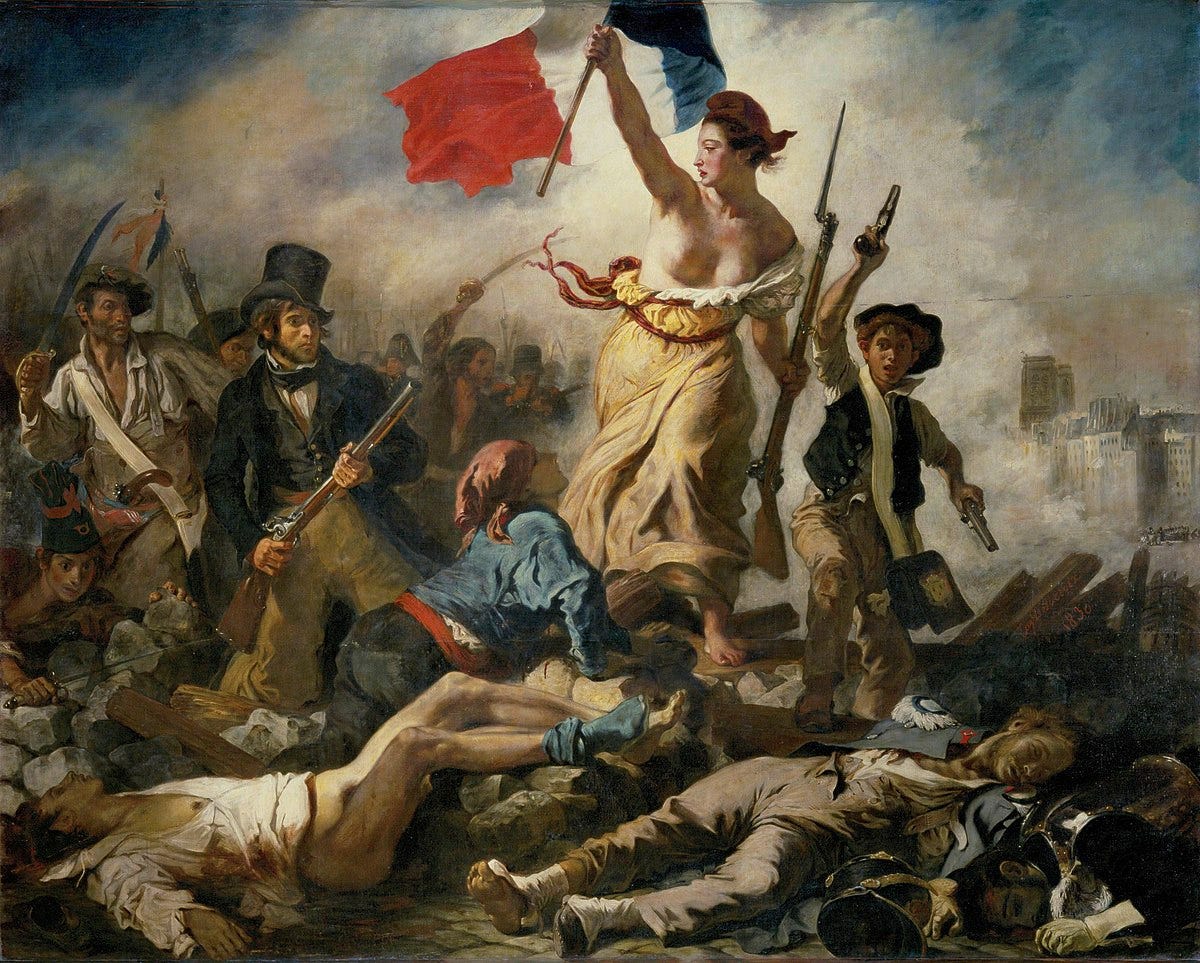
I was born in Douala, which, besides being Cameroon’s economic capital, is a people and a language. And my grandfather’s mother was a Douala woman who married an Ewodi man. At their time, such a union was rare because the Douala people ruled over many people, including the Ewodis. But because the Doualas and Ewodis are patriarchal societies, my great-grandmother mostly spoke Ewodi to her children, but this didn’t prevent my family from speaking both Ewodi and Douala, as the latter was the lingua franca for many Sawa people. Sawa in Douala means “coast”,”shore”, but it is also a powerful word that encapsulates the richness of my people as it defines a multitude of cultures that culminate during the Ngondo.
The Ngondo is a water festival during which all Sawa chiefs and people gather and compete with each other, doing a dugout race to celebrate the jengu — the spirit inhabiting the Wouri river that crosses Douala. As a child, it was a moment I very much looked forward to because it meant visiting Tondè, my grandfather's village, to witness the wizard give his benediction to the rowers, watch them training, and enjoy my relatives showing us how they fished crocodiles — Ewodi people are powerful rapid rowers and swimmers rightly for that reason.
During the race, rowers from each Sawa ethnic group row in perfect synchronicity while the head of the rowers sings a song whose purpose is to keep people synchronised and give them the courage to win. The rowers then follow, repeating sentence after sentence the song's lyrics. Each dugout is painted in bright colours and decorated with a magnificent figurehead, symbolising the relationship each ethnic group has with the jengu, which happens to be either a crocodile or a manatee.
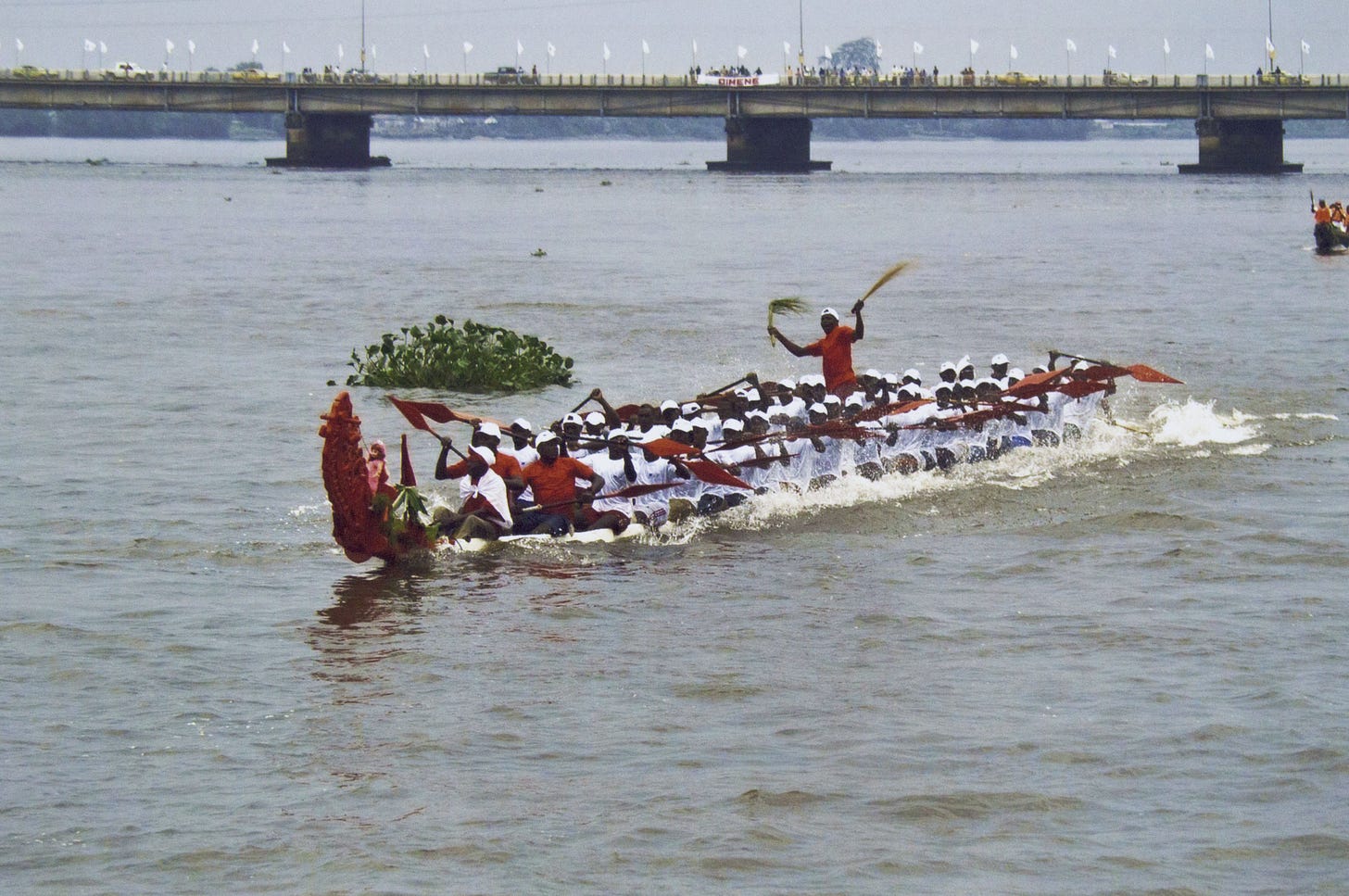
During the five years we lived in Douala, I marvelled as a child watching the Ewodi people win as we followed the race on a boat. I was so proud we won each year. Like the Olympics or the World Cup, the Ngondo enhanced my sense of identity and belonging. During the days of the festival, I wasn’t the child of the “makala” (white man in Ewodi and Douala) but the granddaughter of Emmanuel Njalle. My grandfather is a highly respected figure in the Douala and Ewodi communities. I never met him, as he passed months before my birth. However, I have heard countless stories of his kindness, generosity, and the father figure he was for his siblings, brothers-in-law, and many of my mother’s cousins. Old friends and acquaintances wouldn’t stop talking about him when we went down to Tondè for the rowers’ benediction before the Ngondo. He passed when he was only 56, but these stories made it appear he had a larger-than-life existence, for everyone remembers him so fondly. So, the Ngondo also served to connect with my family’s story.
Wikipedia says Sawa people represent 12 % of 26 million Cameroonians, so 3 804 240 people. Among them, roughly 400,000 are Douala. Within that group, Ewodi people represent an even smaller number. So, we are not a lot of people, hence why preserving our cultures and languages has become more and more difficult. I thought only people in the diaspora lost their language, but even people born and bread in their homeland do, too. Last year, in October, I participated in a festival in Milan as a host. There, I met E., a fellow Cameroonian who, unlike me, was born and raised in Cameroon and arrived in Europe to study five years ago. E., who is ten years younger than me, has a family name that is so Douala that I had to crack a joke on her when she told me her last name. We bonded over our happiness to meet as fellow Cameroonians but even more as Douala people because we recognised it was a challenge to meet people from our ethnic group when abroad. During our conversation, mixing French and Italian, E. told me she didn’t speak a word of Douala as her parents always spoke to her in French. It left me astonished and made me question the idea that Cameroonians born and raised in Cameroon were closer to their roots and language. I should say, though, that with colonisation, the French colonial system favoured some ethnic groups, whereas others were mistreated. For example, the Bamiléké people were massacred as they were the main fighters of the anti-colonial war. And if we observe them, they are more likely to pass down their traditions and languages than the Douala people who cooperated with the French administration.
In December, I went to Paris and met with the son of one of my late great-uncles, who is in his late forties. He told me he, too, didn’t grow up speaking Douala or Ewodi despite being born and raised in Douala. He only picked it up because he forced himself and asked one of my uncles to be his language buddy. Again, I was astonished because we were three generations of Douala/Ewodi people who didn’t speak our mother tongue, with two who came to live in Europe as full grown-ups. My first cousin once removed is 47, I am 36, and E. is 25. Between each other, we have more or less a ten-year gap, and it shocks me to see how each decade has made a difference in getting us further and further away from our mother tongue.
There are 400,000 Douala people and even fewer Ewodi people. Although the Wikipedia article did not mention whether the number only referred to the Douala people in Cameroon or if it also included the diaspora, this number has been haunting me ever since. I suddenly realised I belong to a people whose languages and cultures are slowly disappearing.
Growing up in France in a very patriarchal family, my mother didn’t speak to my brother and me in Ewodi or Douala. Maybe I am lying there. She did, but only when she was upset. My brother and I don’t have the same affinity for both languages because, contrary to me, he was born in France. My grandmother wasn’t there. She was the one who transmitted the language. When I left France, my grandmother was the person I missed the most. So, my memory imprinted her in her navy blue kabas (kaba is a typical dress for women in Cameroon; navy blue is the colour for widowed women), her Vaseline smell, her embrace, and her speaking to me in Ewodi.
I have always had a thing for languages; no wonder I speak three (albeit European) languages fluently, but how ironic this gift didn’t help me at all get closer to my mother tongue. All I know about Ewodi is thanks to my grandmother talking to me. I don’t grasp the grammar, syntax, or orthography. Nothing. Yet, I have noticed that when we have family gatherings or my mom is on the phone — because phone calls are always a community effort in my family — I am much more alert and attentive. I really try to understand, and to my surprise, I do. If you ask me about a word I won’t be able to tell you, but I will be able to tell you roughly about what has been said.
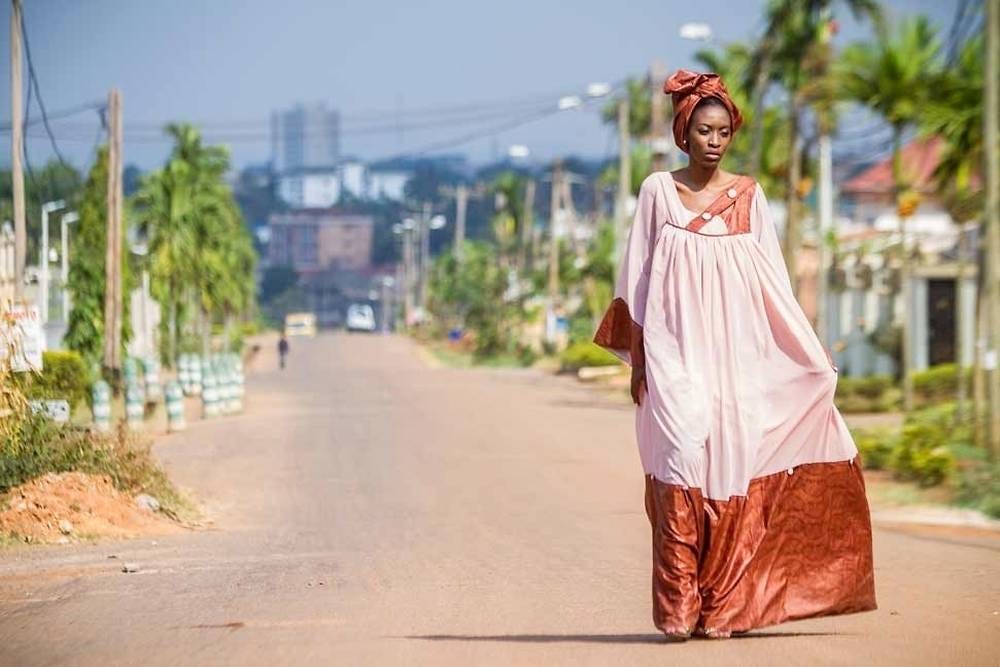
I realised I reached another level when, during a family gathering, one of my uncles cracked a joke, and I laughed to tears. Everyone was so surprised that they asked me to tell them what I understood. It was the first time I didn’t feel like an outsider.
Last year, after months of unproductive research to find a book to learn Ewodi, I instead found one to learn Douala. I didn’t say it earlier, but Douala and Ewodi are very similar languages. If I had to make a comparison, Douala would be the French spoken in France, and Ewodi would be the French spoken in Quebec. So, learning Douala will eventually help me learn Ewodi—or so I hope. Finding this book, it was as if something unlocked in me. It wasn’t just about the grammar or the syntax; some things I had heard all my life started to make sense. It also confirmed that Douala is a very poetic language with beautiful metaphors. My mother, who is now much keener to speak Douala and Ewodi to me, would often tell me some childhood stories slipping full sentences of both languages and breaking everything down for me to help me understand what she calls “le Douala/l’Ewodi profond” (Deep Douala/Ewodi) - the Douala/Ewodi spoken by older people where German, English, and French words are not used and therefore much funnier and soulful.
As I was showing the book to my mother, she nonchalantly said to me, “Haven’t you noticed? with my siblings, we mix Ewodi and Douala?” No, I wouldn’t have because I don’t speak Ewodi or Douala. Yet, I partially understand both as one language because everyone in my family speaks both and switches to one or the other seamlessly. When I try to speak Douala, Ewodi sentences often come out, but I wouldn’t know because it feels natural to me.
In my teenage years, my mother refused categorically to speak any of the languages to me when I asked her to because she shared my dad’s idea that we wouldn’t speak good French if we were to know both Ewodi and Douala. See, this is one of the instances where my dad wasn’t an ally in helping me get closer to my other cultures. I also recognise that my interest in learning the languages was never a constant, either because I wanted to assimilate or simply because the society I grew up in never valued ex-colonies mother tongues. It is also important to note that if people like my cousin and E. spoke French rather than their mother tongue in their family, it means that the French colonial system has done wonders at brainwashing generations of Cameroonians about the value of their cultures in their own country. Except for the two I mentioned initially, none of my cousins speaks Ewodi or Douala because our parents were taught French was more useful and superior.
“Talk to your children in French; if you speak your language at home with them, they will get confused once they need to interact with other people outside.” These are the words our parents heard from teachers at school. But the same teachers would find fantastic pupils who spoke French AND English, German, Spanish, Italian, or Swedish because having a double culture was a plus, an advantage in life if the other culture was European. But don’t get me wrong. I am also not fooled by the fact that generations of Southern and Eastern Europeans suffered from the same issue and, as a consequence, didn’t speak their mother tongues to their children. However, their assimilation was different because French people didn’t colonise them, so the power dynamics differed.
I wanted to talk about that topic because it is rare to read about people from the African diaspora discussing their relationship with their mother tongues. And I think it is important to do so, whether we master them or not because language is one way to keep the connection with our other culture. In Europe, there is no school to teach our languages, so I believe it is important we share our experiences around it to find books and information about our languages before our parents, grandparents, uncles, and aunts leave this world.
I will be turning 37 this year, and I am fine with knowing I’ll be a forever student of Ewodi and Douala. I might not find any Duolingo for learning both, but I will fight to keep learning them through my family, and any resources I can. It is even more important that I am an aunt and godmother to a 5-year-old nephew and a 9-month niece who, like their father (my brother), will grow up hearing Douala and Ewodi but might feel even more distant from their grandmother’s cultures because they won’t be around our family as much as we did. My mother has given each of them an Ewodi nickname, and she sometimes speaks to them in Ewodi, so it is important that they at least know where all this comes from while growing up. And knowing about their grandmother’s mother tongue is part of it. They might never speak Ewodi and Douala, but they must know at least that these are our family’s mother tongues to be curious about the cultures that belong to them.
I am leaving you with a picture of my brother and me with our grandmother during my first communion.
If you are not on Substack, the platform hosting that newsletter, and you read this story in your email and it resonates with you, feel free to forward it to people who might be interested.
Thank you for reading! Le Journal Curioso is where I share my perspective as an underrated fashion professional and discuss the African diaspora in Europe. A monthly subscription is 6€, and a yearly one is 48€. If you’re enjoying what you read, consider upgrading.


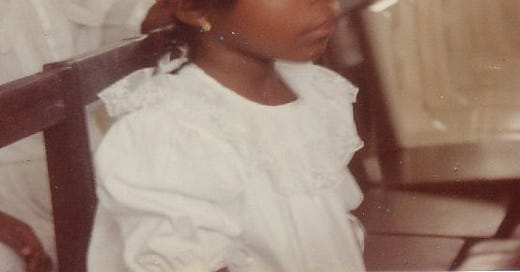


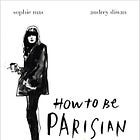
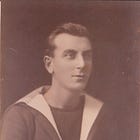


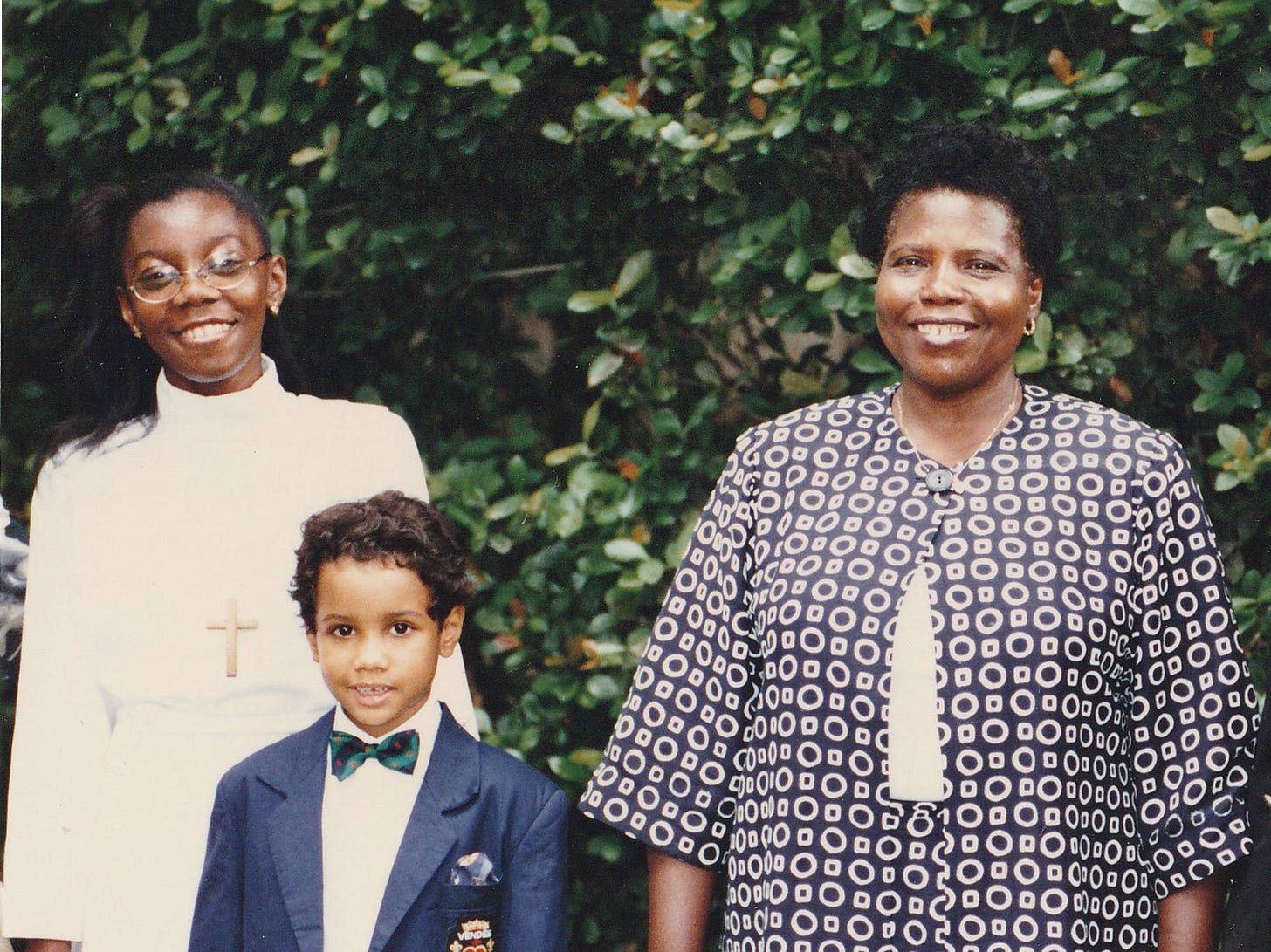
It's astonishing how easily and quickly we lose languages - my parents speak Hokkien, a Chinese dialect said to be older than mandarin, but they never spoke it to us and it is not taught in schools in Singapore...and sometimes I think if everyone was like me, how will this language survive?
Too many thoughts to share concisely in a comment but this article I just read immediately made me think of your piece! https://restofworld.org/2024/mali-ai-translate-local-language-education/?ref=sentiers.media